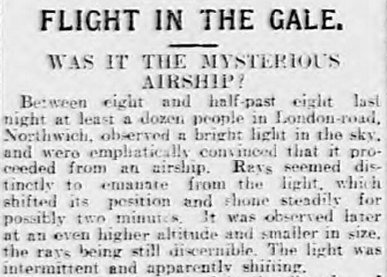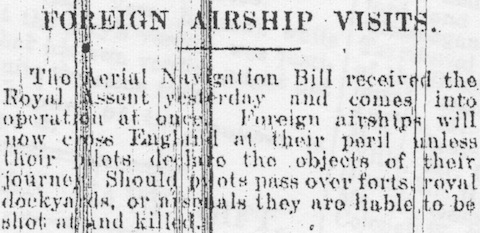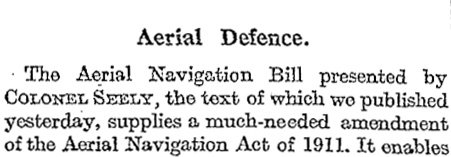Flight mentions the mystery airships in its editorial comment today, though only briefly and somewhat disparagingly. By the same token, it is quite happy to make use of them. The actual topic, inspired by the Daily Telegraph, is 'Our aerial fleet' (p. 107). It begins by claiming that in 'the matter of our aerial defences we have at all times endeavoured to steer clear of alarmist tendencies', and to assume that the government was following 'a considered policy of awaiting developments until such time as it was wise to make a great forward move' rather than accusing it of 'improper procrastination'.
But there comes a time when it is necessary to talk plainly and to say the things that come uppermost in the mind after a close and careful study of the relative strength of our own and other nations' air fleets. That time has come now. We have waited to see the awakening, and we have seen nothing but a continued policy of discouraging apathy, which has left this country hopelessly behind its rivals, without an air fleet worthy of the name, and almost entirely at the mercy of the first aerial power which cares to launch its air squadrons on a mission of destruction across the North Sea.
Britain's policy amounts to little more than watching and waiting:
We play about with small dirigibles which are but of minor count for the purposes of serious war, while Germany rapidly and certainly builds huge craft, capable of taking the North Sea in their stride and which, if report is to be trusted, have already paid us visits by night. Not that we are inclined to take these reports too seriously, but the fact remains that even if German aircraft have not visited these shores it is beyond all question that there is nothing in the wide world, least of all British aircraft, to prevent them so doing whenever those directing them are inclined.
Nor should France's 'enormously strong air fleet', soon to number 'not less than five hundred aeroplanes in effective service, to say nothing of a respectable number of large dirigibles', be neglected:
True, France at the moment is our very good friend and ally, but political friendships are notoriously unstable, and even so, when did Great Britain have to depend upon her friends to supply her own obvious deficiencies?
It is rumoured that the forthcoming Army Estimates will include a provision for £1 million for aviation, but what if the rumours are wrong?
Is there any hope that the Parliamentary 'Supers' who draw their £400 per annum for walking through the lobbies obedient to the crack of the Party whip will rise up in their places and insist that the safety of the country shall take precedence of schemes of so-called social reform, which no one wants and which are frankly designed to catch the votes of the unthinking populace? We fear not.
The only bright lights are 'Mr. Joynson-Hicks, an indefatigable champion in the cause of aviation and an Aerial Defence group in the House, which has done excellent work in calling attention to the parlous state of our air service' (pp. 107-8). But they are isolated and have little influence. Therefore 'It is with something more than pleasure that we note that the Daily Telegraph has taken up this most vital question' (p. 108). Flight fully concurs, and has previously argued, that as a consequence of 'the policy of inaction',
the British aviation industry is dying. Abroad, one improvement follows another with disconcerting rapidity owing in every case to the researches and experiments of private firms. But it cannot be hoped that with our factories idle, with our expert designers and craftsmen dismissed and forced into other careers to make their livelihood, we can ever keep pace with, much less outstrip, foreign activity and improvement.
By the time Britain reaches the same conclusion as every other country, i.e. that it is necessary to equip the 'army with war machines of a number of different types, even at great cost [...] the aviation industry will have ceased to exist'. If nothing is done.
We repeat we are not alarmists, but we cannot view the position without [sic] anything but the gravest misgiving for the future. The political outlook is darker than it has been for many years, and we have it on record that in the opinion of one of our most distinguished soldiers that it is impossible to make successful war without having command of the air. And if war should come suddenly, we most certainly shall not have command of the air -- but the lamp-posts of Whitehall may have unfamiliar ornaments. And well might it be under the circumstances.
Looks like there's a scare coming.
![]() This work is licensed under a Creative Commons Attribution-NonCommercial-NoDerivatives 4.0 International License.
Permissions beyond the scope of this license may be available at http://airminded.org/copyright/.
This work is licensed under a Creative Commons Attribution-NonCommercial-NoDerivatives 4.0 International License.
Permissions beyond the scope of this license may be available at http://airminded.org/copyright/.




